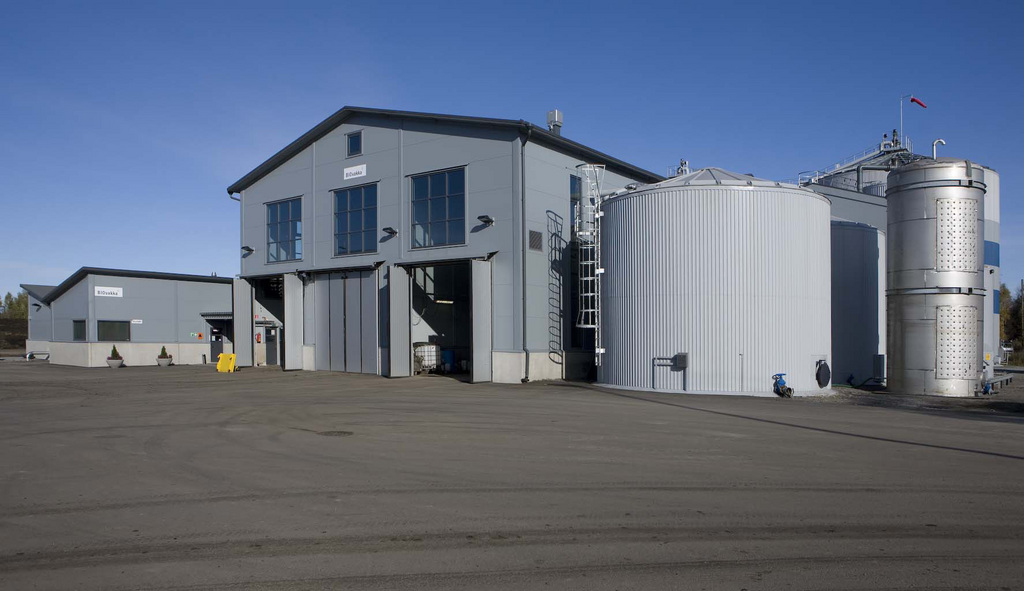Oulun Energia and the energy company Gasum are working together on a local investment in Finland that would allow increased biogas production and processing into a road fuel biogas. The planned biogas plant would be located in conjunction with Oulun Energia’s Laanila eco power plant and, when completed, would be the first biogas plant to use the biodegradable material mixed in with municipal general waste as a feedstock.
Laanila eco power plant converts municipal and industrial waste from across Northern Finland into process steam, electricity and heat. In the joint venture, Oulun Energia is preparing to invest in a waste processing facility that would sort around 45,000 tonnes of biodegradable material from 130,000 tonnes of household general waste each year. Gasum would be responsible for processing the biodegradable waste into biogas and for processing it into a transport fuel.
”A considerable amount of biodegradable waste ends up in general household waste in particular. The treatment process also allows for the recovery of other materials before incineration,” says Pertti Vanhala, Business Director at Oulun Energia.
Biogas helps to curb traffic emissions
Gasum plans to invest not only in the envisaged biogas plant but also in a gas liquefaction unit to enable the biogas produced to be processed into a fuel for heavy duty vehicles. The Laanila plant would be just the second liquefied biogas production plant in Finland.
”Since heavy duty vehicles cannot readily be electrified, liquefied biogas provides the best avenue to cut emissions in truck transport. In May, we opened two new gas filling stations in Oulu, one of which is intended for heavy duty vehicles. During the coming years, Gasum intends to build a total of 50 new liquefied gas filling stations in the Nordic countries,” says Ari Suomilammi, Director, Circular Economy Finland, Gasum.
Besides the new biogas plant, Gasum also plans to enlarge the existing biogas plant in Rusko. The Rusko biogas plant uses separately collected biowaste and local sewage sludge as feedstock from which recycled nutrients are also produced.
Studies show that the Laanila biogas plant would produce around 40,000 MWh of biogas a year. There are plans to increase annual production at the Rusko biogas plant by 20 000 MWh. This additional production would be sent to Laanila for liquefaction and would bring the total annual production of liquefied biogas to 60,000 MWh.
”Together, these projects would produce enough liquefied biogas to replace diesel as fuel in around 120 trucks. Biogas cuts traffic emissions by up to 85% compared with diesel,” Ari Suomilammi sums up.
Local interest is growing in using biogas to reduce traffic emissions. The City of Oulu recently decided to acquire five biogas-powered buses for one of the city’s bus routes.
Aiming to commission the plant in 2021
The environmental impacts of the project have already been assessed and the next steps are to update Laanila eco power plant’s environmental permit and work on the technical design of the project. This will be followed by any investment decision. Similarly, a start has been made on updating the environmental permit for the Rusko biogas plant. The aim is for the Laanila biogas plant to complete during 2021.
“This investment would take the biogas economy forward across Northern Finland by using the latest technology,” Ari Suomilammi and Pertti Vanhala point out.
For more information please contact
Ari Suomilammi, Director, Circular Economy Finland, Gasum. Phone: +358 400 653 351, firstname.surname(a)gasum.com
Pertti Vanhala, Oulun Energia, Business Director. Phone +358 44 70 33 701, firstname.surname(a)oulunenergia.fi
Author
Tapio Tuomi
Suomen Lähienergialiitto ry
tapio(at)lahienergia.org
Source Gasum.com


